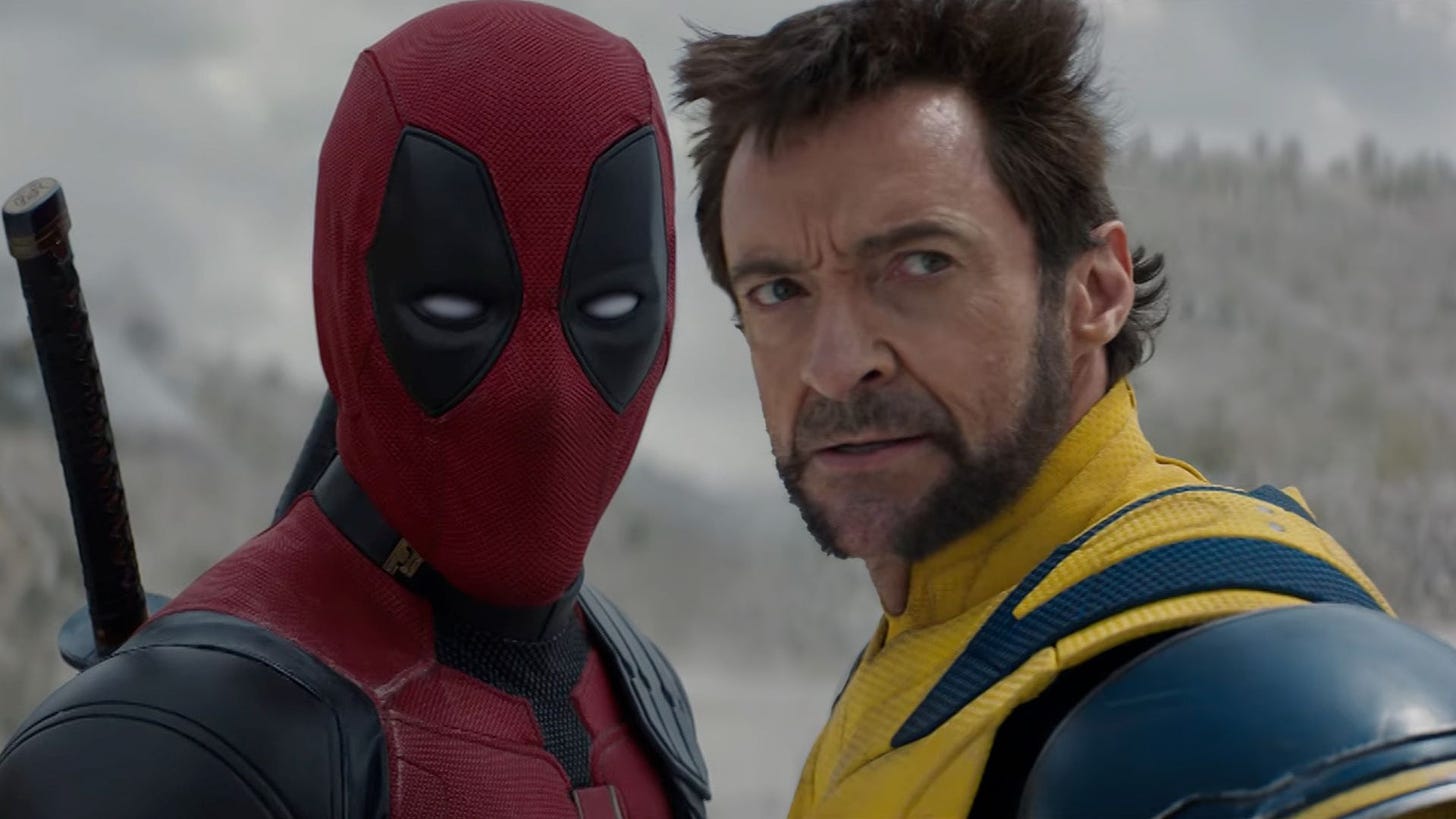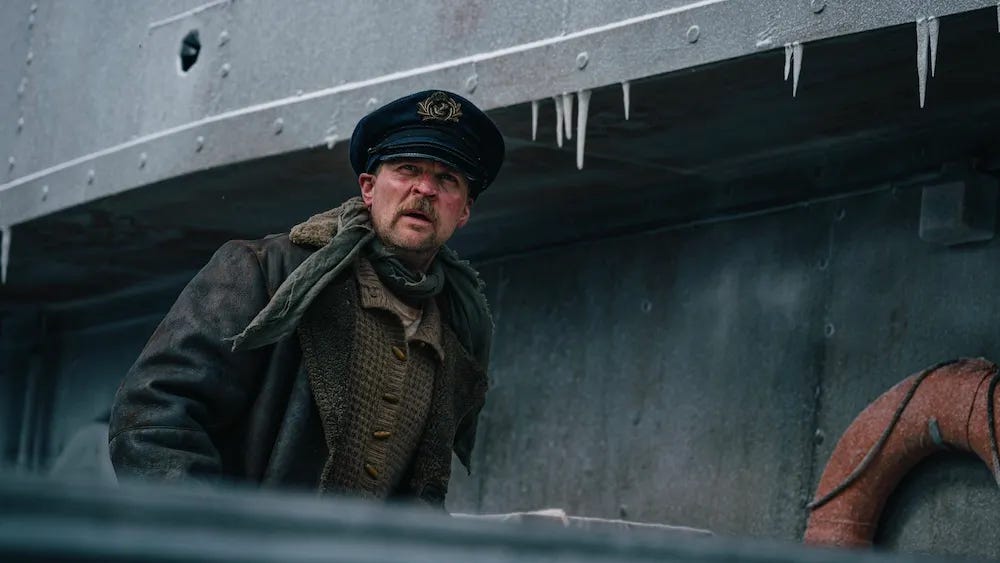In Review: 'Deadpool & Wolverine,’ 'The Arctic Convoy'
A third Deadpool adventure tries to tweak superhero cliches while simultaneously indulging in them while, elsewhere, a story of World War II heroism gets another telling.
Deadpool & Wolverine
Dir. Shawn Levy
128 min.
If self-awareness was greatness, Deadpool & Wolverine would have no competition for the year’s best film. Marvel’s “Merc With a Mouth” has long acknowledged and broken the fourth wall, but the third and latest film to feature the character tries to smash through the screen Jack Nicholson-in-The Shining style. Released at a low ebb for Marvel’s cinematic ventures, the film acknowledges its place as the horny, ironic, blood-soaked black sheep the MCU inherited after Disney acquired Fox, both with its cheeky tone and winks at the camera and a plot that nods (vigorously) to the Deadpool films’ status as outliers in Disney’s PG-13 pantheon. Scripted by star Ryan Reynolds, director Shawn Levy, Rhett Reese, and Zeb Wells, the movie knows what it’s doing.
The only problem: what it’s doing is exhausting, a mix of effortful pop postmodernism, quotation mark-bracketed badassery, and occasional globs of sentiment. That combination isn’t new to the series. Both 2016’s Deadpool and its 2018 sequel make it work fairly well. This third entry, however, groans under the weight of everything it’s trying to shoulder to the inevitable post-credits gag. The opening scene, in which Deadpool digs up Wolverine’s skeleton in an effort to save his corner of the multiverse from destruction, then uses the bones to kill a small army of enemies, serves both as the film’s mission statement and a warning of what’s to come. It’s not particularly thrilling or funny but it’s big and loud and feels like it lasts forever.
Six years have passed for Wade Wilson, a.k.a. Deadpool, since the events of Deadpool 2 and they haven’t been great. Vanessa (Morena Bacarin), remains in his life but not as his girlfriend. He (sort-of) makes ends meet selling used cars but a years-ago failed attempt to join the Avengers in the mainline MCU (called, we learn, “The Sacred Timeline”) still stings. So when a group of soldiers from the Time Variance Authority, the organization charged with keeping the multiverse safe and operational, shows up at his surprise birthday party, Deadpool greets them with a mix of weariness and welcome. When he’s taken to meet Mr. Paradox (Matthew Macfayden), a stuffy TVA manager, he’s told he has a bright future in the MCU proper. But there’s a catch. Paradox wants to prune Deadpool’s own universe—which hasn’t really been the same since the death of Wolverine, its “anchor being”—from existence. Unwilling to accept the loss of everyone he knows and ostensibly loves, Deadpool sets out on a multiversal quest to find an alternate Wolverine to fill the void left by the final scenes of Logan.
It’s a clever set-up that finds Deadpool interacting with a bunch of alternate universe Wolverines (many recognizable from the comics). Then, cleverer still, it sends him into a wasteland populated by the shattered remains of superhero films made for 20th Century Fox before the Disney merge. There he joins a ragtag group of discarded heroes to fight Cassandra Nova (Emma Corrin), Charles Xavier’s evil twin. It’s best not to spoil who shows up for that battle (or who they play) since the cameos, some genuinely unexpected, give Deadpool & Wolverine welcome jolts whenever they arrive. It needs them. As the title promises, Deadpool eventually finds a living, acceptable Wolverine (Hugh Jackman, of course), but the chemistry between the two characters never really sparks to life. That’s partly because it offers no surprises. One’s wacky. One’s gruff. Sometimes they fight.
Deadpool & Wolverine’s attempts to use Jackman to bring dramatic gravitas feel phony (and not the fun kind of phony the film goes for elsewhere). But it’s the Deadpool half of the Deadpool & Wolverine that becomes the film’s biggest drag. Charitably speaking, Reynolds exhausted the character’s potential by the end of Deadpool 2. His snarky superheroics in Deadpool & Wolverine have the desperate edge of a performer worried about losing his audience. The moments the film tries to make Deadpool feel like a real character only spotlight the flimsiness of it all, putting a lot of weight on his attachment to a supporting cast whose screen time is limited almost entirely to a couple of scenes at the beginning and end of the film. Maybe to care about such problems is to miss the point of a film designed to scoff at any attempt to take it seriously. But movies can’t live on meta alone. —Keith Phipps
Deadpool & Wolverine is now playing everywhere across the multiverse.
The Arctic Convoy
Dir. Henrik Martin Dahlsbakken
108 min.
Arriving on the heels of the Netflix movie War Sailor, a large-by-Norwegian-standards production about the enlistment of Norway’s merchant sailors in the Allied fight against the Germans in World War II, Henrik Martin Dahlsbakken’s The Arctic Convoy is a slightly scaled-down tribute to the same effort, right down to titles that are practically copy-pasted from one film to the other. (Some 30,000 sailors worked courageously on a supply line to Allied troops off the Atlantic in Europe and the Soviet Union, and scores of ships and Norwegians were lost in the process.) Dahlsbakken and his screenwriters carve out their own piece of the war, following a perilous 12-day journey from Iceland to Murmansk that took significantly longer than expected. But the film plays by the war-movie rules, putting stock characters through a series of tense setpieces that may not be particularly memorable, but get the job done.
The one big risk The Arctic Convoy takes is dropping the audience into the mission in medias res, four days into the mission, without introducing the major players first. That brings the instant gratification of an immediate crisis on the high seas, but it takes a while for the drama on board the vessel to get clarified to any great effect. The convoy in question is shipping crucial armaments to the Eastern Front in the lead-up to the Battle of Stalingrad, and though the ship has a gunner aboard, the Norwegian freighters are supposed to be escorted by the Allied military, which is better equipped to fend off German planes above and U-boat attacks below. But when an intelligence report—a faulty one, it turns out—peels the allies away, the shipping vessels are more or less sitting ducks.
When the hearty Captain Skar (Anders Baasmo), a veteran of more than a dozen Atlantic crossings, opts to forge ahead despite the terrible risks, it causes a near-mutinous response from some of his underlings, most notably First Mate Mork (Tobias Santelmann), who’s still shaken up by a previous mission where he captained a torpedoed ship. Yet Skar’s injury during an extensive duel with a German plane puts Mork in charge and he attempts a radical re-routing to steer the vessel out of attack range and into the ice floes of the northern seas.
Theres’s a gripping stretch of The Arctic Convoy where Dahlsbakken strings together one white-knuckle sequence after another: The aforementioned battle with an enemy plane that dives relentlessly with bombs and machine-gun fire; a tense navigation through a minefield where the sailors have to push away from the fog-shrouded mines while avoiding the firing pins; and a second plane attack where they try to improvise camouflage to disguise the ship. That doesn’t stop the clichés from coming—we recognize immediately which war-movie types are marked for certain death or redemption—but like a Norwegian freighter sneaking supplies past the Germans, it’s an effective tactic to get to the right destination. — Scott Tobias
The Arctic Convoy is now playing in select theaters.









As someone who loved the first DEADPOOL unequivocally (at the time, it felt like a breath of fresh air compared to the moribund MCU and whatever DC was trying to do) and was reasonably entertained by the second, it’s so strange to me that my interest in this new one is practically nil. Has been since I saw the first trailer. If I do go see it, it won’t be out of a sense of obligation, but rather because there’s nothing else out there.
> Paradox wants to prune Deadpool’s own universe—which hasn’t really been the same since the death of Wolverine, its “anchor being”—from existence.
This is one thing me find deeply stupid about TVA, and MCU in general. Infinite timelines, spanning entire universe, but everything always, always, always focused on Earth from hundred years ago to present. Entire timeline is "anchored" by Wolverine? One guy in whole history of entire galaxy?
Infinity stones are foundational to entire universe and three of them happen to be in Midtown at same time? (Me do always think it would be interesting to see effect Snap has on someplace in entirely different galaxy, where no one has any idea who Thanos or Avengers or and have no way of knowing where everybody went or why they came back.